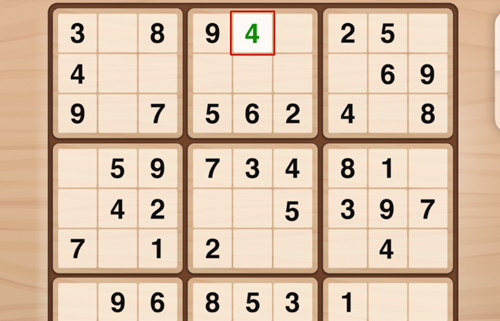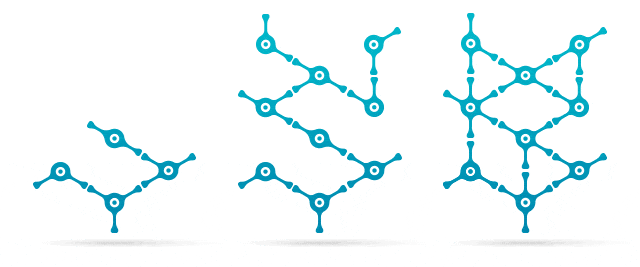
Multi-platform
Sudoku: Brain Game
Cognitive training brain game
Play "Sudoku" online and boost your cognitive abilities
Get access to this scientific brain training resource
Challenge your brain
Sudoku is an online brain training game . In order to advance in the game, we will have to fill in the gaps with the corresponding numbers, so that they are not repeated in the same row, column or subgrids. However, as the level of complexity of this brain training game increases, the cognitive demands will increase.
As you advance and help improve your cognitive skills trained in this online brain game, it will advance with you Sudoku is a scientific resource designed to constantly measure performance and automatically regulate the difficulty to ensure that the user is getting the most out of each training session. The mind game Sudoku is appropriate for children and adults and can help improve essential cognitive skills.
How can the brain game "Sudoku" improve your cognitive abilities?
Training with brain games like Sudoku stimulates specific neural patterns. The repetition of this pattern through consistent training can help improve the creation of new synapses and neural circuits capable of reorganizing and recovering damaged or weakened cognitive functions
This brain game can be played by anyone looking to test and improve their cognitive performance.
1st WEEK
2nd WEEK
3rd WEEK

Neural Connections CogniFit
Which cognitive skills can you train with the online brain game "Sudoku"?
The cognitive skills that this game trains are:
- Planning: Planning our steps and trying different numbers can help remove the wrong ones and help find out which number goes in a particular gap. The strategies for this mind game can vary, therefore it is important to plan. Training our planning skill is essential to anticipate future consequences and optimize our activities,like when we organize our tasks on a day-to-day basis.
- Spatial Perception: Handling well the spaces in which we enter the numbers is essential to solve Sudoku games. It would be impossible for us to carry out these activities without an adequate spatial perception. A good spatial perception allows us to move correctly around our environment, for example, it helps to avoid invading other lanes when driving.
- Inhibition: It is common to confuse or ignore certain numbers and answer in the wrong box. It is important to be able to detect this in time and inhibit the behavior. Our environment is complex and constantly changing and often we will take action that is not the appropriate one for the situation, because the situation has changed or we have made a mistake. It is very important to be able to stop in time to avoid these problems. This happens when we are writing a message to a friend and we get confused and almost send it to someone else. We must be able to inhibit the action of sending the message in order to correct it in time.
- Phonological short-term memory: We will have to mentally retain the numbers we want to place on the grid in order to respond quickly and accurately. Retaining the numbers in the sudoku puzzle can make it easier to retain other information from our daily lives, such as some items on the shopping list or a phone number.
Other relevant cognitive skills are:
- Shifting: It's normal to make mistakes by filling in boxes with the wrong number and then detect it later, when the numbers do not match. To correct these numbers we will need our shifting or cognitive flexibility skill. Playing Sudoku makes it is possible to strengthen this cognitive capacity. Optimizing our cognitive flexibility or shifting helps us adapt better to unforeseen events and correct our behavior, such as when we correct mistakes we have made in writing a letter.
- Working memory: In this game we will have to remember and manage the numbers to find which is missing in each box, this requires our working memory. By playing Sudoku it is possible to work on this cognitive ability. Improving our working memory is important to efficiently manipulate the information we retain mentally. For example, we use this cognitive ability to perform mathematical calculations.
- Updating: In Sudoku we will have to make sure that the number we are entering is correct and fits with the rest, that we are taking into account all the numbers, boxes, rows, columns and quadrants, all of this depends on our updating skills. Playing Sudoku can help us improve this cognitive capacity. A good updating skill helps us to detect when we deviate from our main objective, so that we can monitor our day-to-day activities more quickly.
- Focused Attention: We need to focus on each number and each gap to find out which number will fit in each place. To be able to do this we need to focus our attention. Playing Sudoku can help strengthen this cognitive skill. A good focused attention allows us to listen to what we are told in class or concentrate on reading.
- Visual Scanning: We'll need to find the gaps and the rest of the numbers at a glance. By playing Sudoku you can stimulate your visual scanning. Strengthening our visual scanning can help us to find stimuli in our environment, for example, traffic signs
What happens if you don't train your cognitive skills?
The brain is designed to reserve resources, which causes it to eliminate the connections that it doesn't use often. This means that if you don't regularly use a certain cognitive skill, the brain will stop sending it the resources that it needs, and it will become weaker and weaker. This makes us less efficient when using the said function, causing us to be less efficient in daily activities.



